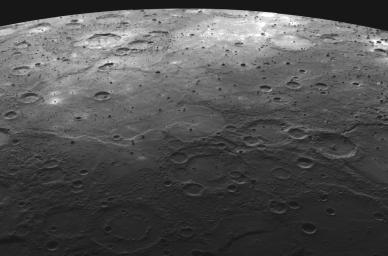MESSENGER images from the mission's first two Mercury flybys have shown that volcanism was an important process in shaping the surface of the Solar System's innermost planet. Motivated by these new insights gained from the MESSENGER data, as well as by the renewed interest in lunar exploration on the part of many nations, "Volcanism on the Moon and Mercury" has been selected as the subject of the upcoming Brown-Vernadsky Microsymposium 49, to be held March 21-22, 2009, in The Woodlands, Texas. The NAC mosaic shown above is being used as the background image for a poster that is advertising this scientific meeting. The mosaic, which shows the western limb of the planet with north to the right, was assembled from individual NAC images acquired as the spacecraft approached the planet during the second Mercury flyby, including three images previously released on October 8, 2008, October 28, 2008, and January 13, 2009. Visible in the mosaic are many lava-flooded craters and large expanses of smooth volcanic plains, which appear similar in texture to volcanically emplaced mare deposits on the Moon. At the microsymposium, scientists will gather to compare and contrast volcanism on the Moon and Mercury, including eruption styles and flux, the timing of volcanism, lava compositions and structures, and linkages between volcanism and the impact history and interior evolution of the two bodies.
Date Acquired: October 6, 2008
Image Mission Elapsed Time (MET): 131766475-131766522
Instrument: Narrow Angle Camera (NAC) of the Mercury Dual Imaging System (MDIS)
Resolution: About 300 meters/pixel (0.2 miles/pixel) at the bottom of the image
Scale: The bottom of this image is about 880 kilometers (550 miles) across
Spacecraft Altitude: 16,200-16,400 kilometers (10,100-10,200 miles)
These images are from MESSENGER, a NASA Discovery mission to conduct the first orbital study of the innermost planet, Mercury. For information regarding the use of images, see the MESSENGER image use policy.

 Planetary Data System
Planetary Data System












